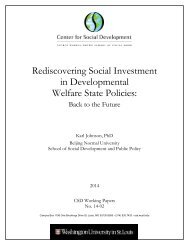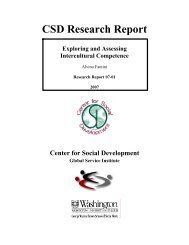Perceived Effects of International Volunteering - Center for Social ...
Perceived Effects of International Volunteering - Center for Social ...
Perceived Effects of International Volunteering - Center for Social ...
Create successful ePaper yourself
Turn your PDF publications into a flip-book with our unique Google optimized e-Paper software.
<strong>International</strong> networks. Respondents from both organizations believe that their lives were enhanced by<br />
making friendships with those in other nations. Longer-term WorldTeach alumni were more likely<br />
to continue corresponding with these connections. In addition to friendship, alumni reportedly drew<br />
upon these associations to coordinate humanitarian aid projects, research trips, internships,<br />
exchange opportunities, or return trips to the country. Those in the host country also benefited from<br />
these connections as alumni provided money and resources to the organization or community<br />
members, even after they returned home. This finding indicates that volunteers’ networks are a winwin<br />
<strong>for</strong> both parties. However, alumni occasionally expressed concern that resources associated with<br />
these relations may engender a sense <strong>of</strong> entitlement and decrease a community’s self-reliance.<br />
Intercultural understanding. While a top motivation <strong>for</strong> all alumni was to travel and live abroad,<br />
respondents believed that volunteering would <strong>of</strong>fer a unique experience, different from other <strong>for</strong>ms<br />
<strong>of</strong> travel or tourism. Nearly all alumni reported that their experience increased their appreciation <strong>of</strong><br />
other cultures and exposed them to new ways <strong>of</strong> seeing the world. <strong>Volunteering</strong> allowed them to<br />
gain firsthand knowledge <strong>of</strong> global realities through direct interaction with host communities. This<br />
finding has valuable implications <strong>for</strong> policy aimed at enhancing global education and cross-cultural<br />
understanding.<br />
Some alumni expressed concern, however, that this transfer <strong>of</strong> knowledge was in one direction. The<br />
unilateral structure <strong>of</strong> sending programs may exclude individuals in the host culture from gaining a<br />
comparable understanding <strong>of</strong> a volunteer’s customs, traditions, and ways <strong>of</strong> life.<br />
Civic engagement. Survey data <strong>for</strong> this report reveal little about the effect <strong>of</strong> IVS on volunteers’ civic<br />
engagement. Although some alumni believed the experience increased their participation in cultural,<br />
environmental, or leisure activities, we know little about the nature <strong>of</strong> these activities. Future reports<br />
will reveal more on the effect <strong>of</strong> IVS on volunteers’ civic engagement.<br />
Career outcomes. The effect <strong>of</strong> volunteering on current and future employment is consistent with<br />
volunteer motivations as well as the respective goals <strong>of</strong> the two organizations. A higher percentage<br />
<strong>of</strong> WorldTeach volunteers serve with the intent <strong>of</strong> gaining employment skills, or to improve their<br />
chances <strong>of</strong> finding a job. Longer-term volunteering may be viewed as an employment alternative,<br />
similar to internships, where volunteers can “test the waters” or gain specific skills to advance their<br />
future careers. In this sense, volunteer service may be considered job training <strong>for</strong> individuals aspiring<br />
to work in international development, non-pr<strong>of</strong>it management, or intercultural studies.<br />
As a new experience, international volunteering in any capacity can stimulate reflection, which is<br />
critical to developing new skills and abilities. 39<br />
However, programs <strong>of</strong> a longer duration may <strong>of</strong>fer<br />
greater opportunities to build upon language skills, intercultural competence, and other abilities that<br />
may be useful in current or future employment.<br />
<strong>International</strong> volunteer experiences typically fall outside <strong>of</strong> normal, day-to-day routine. Theory<br />
suggests that encounters which are radically different from normal routine have the potential to<br />
40<br />
change an individual’s life direction. Open-ended comments seem to support this theory,<br />
suggesting that international volunteering, particularly when extended over the mid to long term,<br />
39 Pusch & Merrill, 2008; Reiman, Sprinthall, & Thies-Sprinthall, 1997<br />
40 Hunter, 2008; Mezirow, 1991; Taylor, 1998<br />
C ENTER FOR S OCIAL D EVELOPMENT<br />
W ASHINGTON U NIVERSITY IN S T . L OUIS<br />
36
















